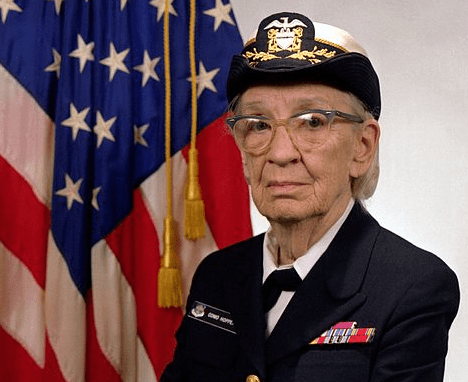“A ship in port is safe; but that is not what ships are built for. Sail out to sea and do new things.” [Grace Hopper]
Grace Hopper was first in areas where men had not even trod before. She refused to believe that a computer could only perform arithmetic and was incapable of doing programs. She also shrugged at the warning that if she developed a compiler-based programming language, everyone would be able to program computers.
Grace Hopper’s father was not a wealthy man and knew he could not leave an inheritance for his children, so he provided them with an education that would allow them to support themselves. He believed strongly that daughters should have the same education opportunities as sons and encouraged Grace not to worry about traditional feminine roles. She graduated from Vassar College in 1928, Phi Beta Kappa, with a BA in mathematics and physics. She accepted a teaching position at Vassar while she completed MA and PhD degrees in mathematics at Yale.
Her career path became clear when she enlisted in the WAVES (Women Accepted for Voluntary Emergency Service) in 1943 and was commissioned as a lieutenant. She was assigned to work at Harvard University on the Ordnance Computation Project, using IBM’s Mark I computer, thought to be the largest digital computer in the United States at the time. For the rest of her life, until she was in her 80’s, she combined work in the military, industry, and academics.
She was only the third person to learn to program the Mark I computer and wrote a 500-page manual that established principles for computer operation. She also developed a compiler, a program that translates instructions written in English into code.
Grace Hopper was the first director of automatic programming for the Ecker-Mauchly Computer Corporation and worked on programming languages for UNIVAC, which operated 1,000 times faster than the Mark I. She was the primary designer for COBOL (Common Business Oriented Language), a programming language used by business and government. She also developed tools for converting non-standard COBOL languages into the standard version and documented her work in manuals that could easily be used by others.
In 1969 Grace Hopper received the first ever Computer Science Man-of-the Year Award from the Data Processing Management Association. In 1973 she became a Distinguished Fellow of the British Computer Society. This marked two firsts as Grace Hopper was the first person from the United States to receive this honor and also the first woman from any country in the world to be so honored. She also received more than 40 honorary doctoral degrees, and a National Medal of Technology in 1991. After she became a Rear Admiral, the United States Navy named a guided missile destroyer the USS Hopper.
Grace Hopper said that she had “received many honors and I’m grateful for them; but I’ve already received the highest award I’ll ever receive, and that has been the privilege and honor of serving very proudly in the United States Navy.” It is fitting that she is buried at Arlington Cemetery.
LEARN MORE:
Books on Grace Hopper: Grace Hopper: Navy Admiral and Computer Pioneer (Charlene W. Billings); Grace Hopper: Programming Pioneer (Nancy Whitelaw); Grace Hopper: Admiral of the Cyber Sea (Kathleen Broome Williams)
Online Biographies: http://www.sdsc.edu/ScienceWomen/hopper.html and http://www.cs.yale.edu/homes/tap/Files/hopper-story.html
Photo of USS Hopper, named for Grace Hopper: http://en.wikipedia.org/wiki/File:USS_Hopper_DDG-70.jpg – photo of USS Hopper
QUESTION OF THE WEEK:
Grace Hopper is credited with saying, “It’s easier to ask forgiveness than it is to get permission.” Does this advice apply more to women than to men?


Trackbacks/Pingbacks